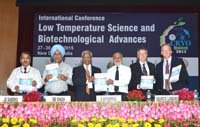Deliberations on cryobiology brings bioscientists together
April 28, 2015 | Tuesday | News | By BioSpectrum Bureau
Deliberations on cryobiology brings bioscientists together
A four-day International Conference on 'Low Temperature Science and Biotechnological Advances' began at New Delhi from 27th April.
In his inaugural address Dr S Ayyappan, secretary, Department of Agricultural Research and Education (DARE) and director general, Indian Council for Agricultural Research (ICAR) mentioned it as a unique opportunity of having an international event on cryobiology for the first time in Asia to bring together the research leaders of diverse disciplines working on crops, veterinary, aquatic species, microbial biotechnology and medical sciences.
The conference is being organised by ICAR-NBPGR and National Academy Agricultural Sciences, India in collaboration with Society for Low Temperature Biology (SLTB), UK and Royal Botanic Gardens (RBG), Kew, UK.
Dr Maurizio Lambardi from National Research Council of Italy who is the immediate past chair of SLTB co-chaired the inaugural session. Prof. R B Singh, immediate past president, NAAS and Dr JS Sandhu (DDG, Crop science) gave their remarks as Guests of Honour. Prof. Hugh Pritchard, head, Seed Biology, RBG, Kew delivered the inaugural lecture entitled 'Plant cryopreservation: Scale, Scope and Hope'. Prof. Pritchard highlighted the importance and need of seed banking through global partnership.
Dr KC Bansal, director, NBPGR and organising secretary and Dr Rekha Chaudhury, convenor, extended warm welcome and thanked the delegates for their participation.
During conference, the session on "Stem Cells and Animal Tissue Biobanking", would be highly informative for medical doctors and researchers working on stem cells preservation and their therapeutic use. Medical doctors are also participating who would present their research work through lectures and posters. The Newspaper Drug Today Medical Times has already carried the news of this International Conference last month.
There is a session on microbes as services of cryopreserved microbial cultures are essential for research for understanding the interactions between microbes and plants. There is immense metabolic diversity of the microorganisms and have varying intrinsic capacity to cope up with sudden osmotic and temperature stresses.
Cryopreservation is a standard technique for different types of microbial preservation and it needs the use of cryoprotectants, different rates of freezing, etc. State-of- the art in optimization of preservation conditions would be analysed.
Throughout the world most of the reputed microbial resource centers have adopted the cryopreservation technology. Using glycerol as a cryoprotectant, to date, over 4000 species belonging to 700 genera have been successfully cryo-preserved. A scientific dialogue on these aspects at the Conference would immensely benefit the researchers.
The world's population is projected to be about 9.2 billion in 2050. This would be needed to be fed with sufficient and nutritious food. However, due to climate change agricultural production is not coping up. Abiotic stress factors such as heat, cold, drought represent key elements which retard the food production. Cold stress is a major environmental factor that limits the agricultural productivity of plants in hilly areas. Intensive discussions on these issues would be held during the conference.
Under the field of Aquaculture, cryopreservation has been successfully achieved for sperm of many fish species mainly on commercially important ones. Advances in research on cryopreservation of oocytes and embryos of fish species are still in infancy and need discussion for additional studies.
Low temperature biology in animal sciences especially related to endangered and threatened species is steadily gaining importance. These species are often difficult to breed both in captivity and under natural conditions. The preservation of valuable breeds using assisted reproductive technologies needs further studies and hence cryopreservation of biological materials from such species holds promise.









